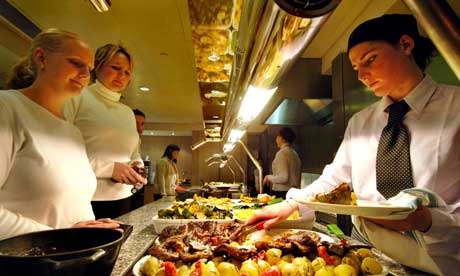
When it comes to eating at work, the culinary offer is not always easy to stomach. On one hand there are canteens that dole out stodge and chips with everything, and on the other there are eateries that prepare healthy alternatives - clearly labelled, cooked-on-request, high-quality lunches.
In March 2007 the Guardian's Office Hours supplement reported on staff restaurants and the vast differences in available service. It's not just a question of staff perks; the fare on offer in your canteen can transform the way you feel about work and how well you perform in the afternoon - it has been shown that a properly balanced and nutritious lunch can help avoid those peaks and troughs that have us reaching for an afternoon chocolate bar and shot of caffeine.
For the past two years the Food Standards Agency (FSA) has been working with the UK's top five caterers - Aramark, BaxterStorey, Compass Group, Elior and Sodexo - and the two major suppliers - Brake and 3663 - developing voluntary commitments to help their customers make healthier food choices at work.
Earlier this year the FSA published a progress report noting that the outcomes were having a positive impact on the 1.5m meals served daily in workplaces, including more options that are lower in fat, salt and sugar, better training on healthy cooking for chefs, and giving customers information on the nutritional content of dishes.
Nevertheless, a report commissioned by design consultancy BDGworkfutures suggests that 62% of office staff still believe it is easier to eat healthy food at home than at work.
Active stance
With a government study predicting that half of the population could be obese within 25 years, it may well be time for employers to take a more active stance in encouraging their workforce to be healthier. After all, VieLife, a consultancy advising on health, well-being and performance, suggests that employees who are healthier and happier could be between 10% and 20% more productive - with an estimated £6.19 annual return for every £1 spent on improving general well-being.
Ernst & Young's caterer, Artizian, provides a very healthy food service at the accountancy firm's London Bridge offices. "Supporting our people must begin at the most fundamental level - their physical and mental health and well-being," says Ernst & Young's employee relations manager, Matthew Thomas. "Ultimately, it is up to people to decide what they'd like to eat but we have noticed a 28% increase in those choosing healthier food in our restaurants over the past year."
One of those using the restaurant is 25-year-old Peter Tilley, an internal communications executive. At his previous job Tilley had no on-site catering and would choose between the local sandwich shop or pasty bar. Now he regularly eats breakfast and lunch - often chosen from the gourmet salad bar - and has noticed a change in his overall health. "It is difficult to measure a change in productivity but I definitely feel fuller for longer, and hunger doesn't become a distraction. I don't get that post-lunch drowsiness," he says.
Food and beverage company Nestle UK also rose to the challenge of overhauling their staff catering facilities by providing healthier options for employees, but went a step further in also addressing staff exercise.
"We began to recognise in our people the same problems we see in the country as a whole - obesity, diabetes and heart problems," says Dr David Batman, head of occupational health, safety and employee wellness at the company. "The risk factors for those are smoking, nutrition and exercise."
Nestle launched an employee wellness programme focusing on three key areas - nutrition, exercise and mental resilience - and began to make changes across the company to transform attitudes from the boardroom down.
To help get employees moving they signed up to the Global Corporate Challenge (GCC) - an annual competition in which teams from various companies are challenged to "walk around the world" in 125 days. More than 20% of Nestle UK's staff signed up, wearing pedometers and clocking - in one case - more than 30,000 steps a day, burning an average 535 calories. Staff started walking to work and having walking meetings, and the firm noted 25% less car usage and a 48% decrease in trips in the lift. Some 50% of participants reported weight loss, with 62% losing more than 7lbs. By the end of the competition Nestle UK was named Most Active Business.
External impact
Simon Drew was captain of a Nestle team that ranked third in the whole competition and found his involvement had a big impact on his life outside work. "The competition made us look at our daily activities in a different light, so instead of using the car to take our children to school we opted to walk," Drew said. "We even started walking, cycling and, in some cases, running to work."
One member of Drew's team lost almost a stone in weight and the whole team worked closer together, helping each other out. More people are keen to join the next GCC and Drew says: "Some of the team are now more active. We've all enjoyed doing different activities outdoors. I think people have realised that exercise can be fun."
Batman is enthusiastic about the effect it has had on staff. "It created a buzz around the business and got people talking," he says. "People are sleeping better, they're more energised and they're telling us they want more initiatives like this."
He believes more companies will need to take the initiative with employee well-being programmes, despite concerns that smaller enterprises may struggle to access available expertise. But in terms of results he believes it pays dividends. "It's a simple change but it hasn't really cost us anything," he says.

